National
New York Times called out for coverage of transgender people
GLAAD billboard circled newspaper’s Manhattan headquarters on Wednesday morning
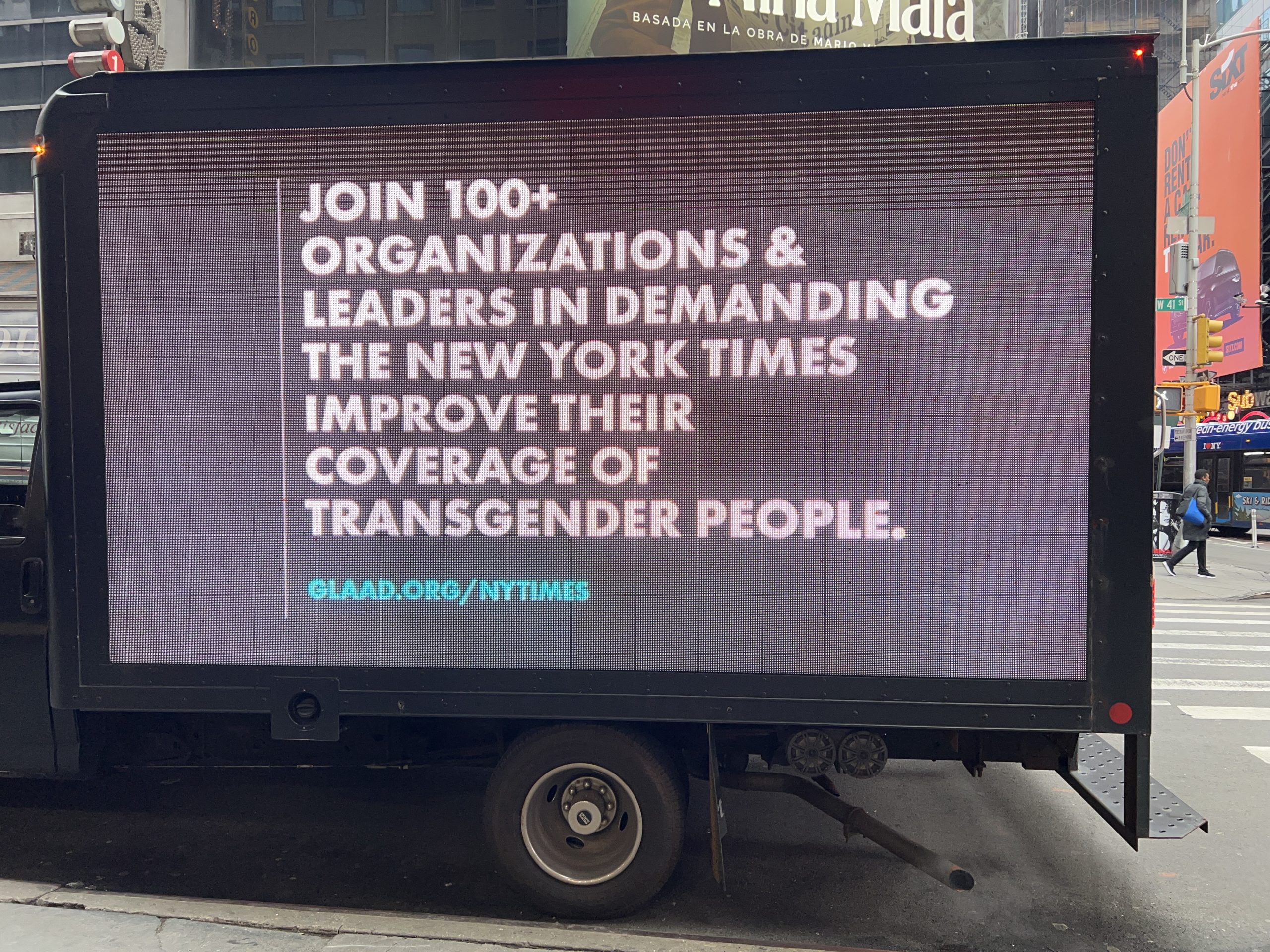
In a one-two punch aimed directly at the New York Times; more than 100 contributing writers, fellow journalists, celebrities and advocacy organizations today joined GLAAD in demanding change in how the newspaper covers transgender issues and trans people.
First, GLAAD hired a billboard truck to circle the newspaper’s Manhattan headquarters this morning with signs saying, “Dear New York Times: Stop questioning trans people’s right to exist and access to medical care,” among other messages.
“I think what what’s most upsetting here is the damage this is doing,” Sarah Kate Ellis, GLAAD CEO and president of the world’s largest LGBTQ media advocacy organization, told the Washington Blade in her first phone interview on the topic Tuesday. “Every day they’re not stopping is doing more damage. Every time a new article comes out that debates whether or not trans people should receive board-approved healthcare is damaging. And so I feel really strongly that their coverage is dangerous.”
Then, to protest what GLAAD calls the Times’ “irresponsible, biased coverage of transgender people,” representatives of the organization joined contributors for the Times outside the paper’s building this morning, as they delivered two open letters and issued a joint statement, calling out a “pattern of inaccurate, harmful trans coverage.”
The coalition demands the Times immediately “stop printing biased, anti-trans stories,” meet with members and leaders in the trans community within two months, and within three months hire at least four trans writers and editors as full-time members of the Times staff.
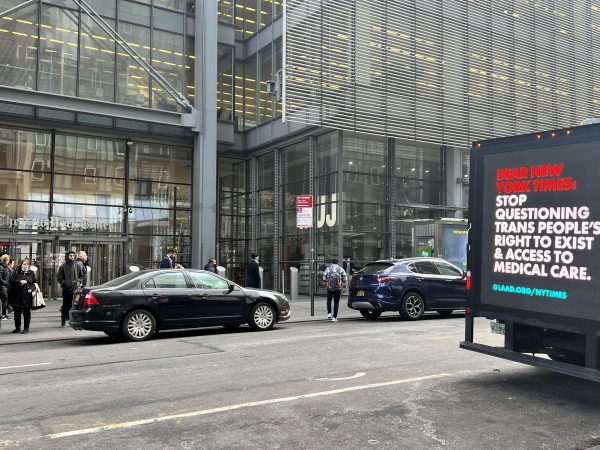
Joining GLAAD are the Human Rights Campaign, PFLAG, the Transgender Law Center, Transgender Legal Defense and Education Fund, the Women’s March, director Judd Apatow, comedian Margaret Cho, actor Wilson Cruz, actresses Tommy Dorfman, Lena Dunham, Jameela Jamil, drag superstar Peppermint, activist Ashlee Marie Preston, Jeopardy! champion Amy Schneider, writer/director/actress Shakina, actress, Instagram influencer and stepmom to Zaya, Gabrielle Union-Wade, TV personality Jonathan Van Ness, activist Charlotte Clymer and more.
“This has been an effort at GLAAD for over a year now,” Ellis told the Blade. “We’ve had several off-the-record meetings with the New York Times to share with them our concerns about the coverage and the reporting that they’ve been doing on the trans community.”
But those concerns fell on deaf ears, said Ellis, and the conversations were unfruitful. “We wouldn’t be going out with a public letter in coalition if they were fruitful. You know, for us going public, it’s always the last resort.”
Times Journalists Speak Out
As GLAAD worked toward publishing its letter, the organization was contacted by Times contributors already in the process of composing their own. A core team of eight journalists collaborated to condemn what they called the newspaper’s anti-trans bias and the real-world impact of that transphobic coverage.
The authors are Times freelancers Harron Walker, Eric Thurm, who is also campaigns coordinator at the National Writers Union and a steering committee member of the Freelance Solidarity Project, Sean T. Collins, who is also a member and organizer of the Freelance Solidarity Project, Cecilia Gentili, a longtime trans activist, Jo Livingstone, Muna Mire, and Chris Randle, a member of the steering committee at the Freelance Solidarity Project.
They were joined by Olivia Aylmer, a member of the steering committee at the Freelance Solidarity Project who is not a freelancer for the Times.
Not only did other contributing writers sign-on, but so did journalism colleagues, both cisgender and trans, as well as members of the Trans Journalists Association.
“A diverse group of people came together to bring you this complaint,” they wrote. ”Some of us are trans, nonbinary, or gender nonconforming, and we resent the fact that our work, but not our person, is good enough for the paper of record. Some of us are cis, and we have seen those we love discover and fight for their true selves, often swimming upstream against currents of bigotry and pseudoscience fomented by the kind of coverage we here protest.”
Those signing that letter include Ashley P. Ford, Roxane Gay, Carmen Maria Machado Thomas Page McBee, Andrea Long Chu, Carmen Maria Machado, John Cameron Mitchell, Zach Stafford, Raquel Willis and Maia Monet, among others.
Their letter, addressed directly to Times Standards Editor Philip Corbett, calls out the country’s third most-read paper for executing what it says is “poor editorial judgment,” repeated lack of context in its reporting on trans issues and following “the lead of far-right hate groups in presenting gender diversity as a new controversy, warranting new, punitive legislation.”
“There is in fact an unethical bias against trans people and transnesss within its coverage of trans issues, by and large,” said Walker, one of the organizers of the contributors’ letter. “There is a pattern of bias, and it’s a violation of the standards own policy as laid out by the standards desk.”
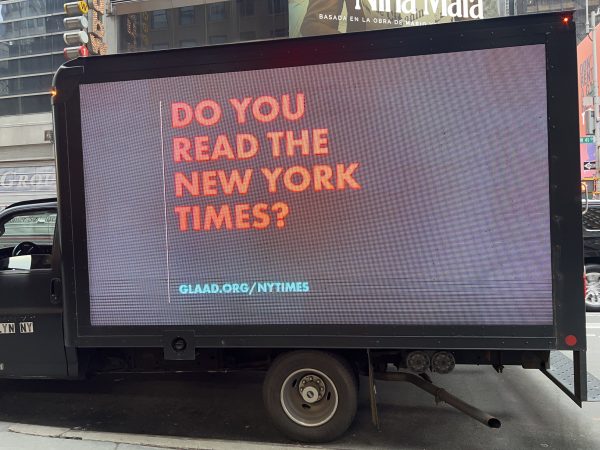
States that have seized upon this anti-trans reporting and opinion pieces by the Times include Alabama, Arkansas and Texas. Already, those states have joined Florida, Oklahoma, South Dakota, Tennessee and Utah in enacting discriminatory legislation.
Of these, Utah and South Dakota have passed healthcare bans that journalist Erin Reed calls “exceedingly cruel.” For example, South Dakota’s ban is one of those providing specific provisions on how to medically detransition trans teenagers, a practice now state law in Alabama and Arkansas.
“The New York Times coverage is feeding into defending these laws, by virtue of the fact that it’s the so-called paper of record,” Walker told the Blade. “It has one of the largest reaches of any newspaper in the world, it is respected. Even if people on the far right may dismiss it as the ‘failing New York Times,’ it still holds a legitimacy in a process that, you know, means something.”
‘Pattern of bias’
“Plenty of reporters at the Times cover trans issues fairly,” the contributing writers’ letter states. “Their work is eclipsed, however, by what one journalist has calculated as over 15,000 words of front-page Times coverage, debating the propriety of medical care for trans children published in the last eight months alone.”
GLAAD notes that officials in Texas quoted Emily Bazelon’s June 2022 report to go after families of trans youth in court documents over their private, evidence-based healthcare decisions.
Former Arkansas Attorney General Leslie Rutledge cited three Times articles in her amicus brief supporting an Alabama law that criminalizes doctors and parents for ensuring trans youth can access necessary medical care: Bazelon’s 2022 story, Azeen Ghorayshi’s January 2022 piece, and Ross Douthat’s April 2022 op-ed.
The Times’ reporting on trans youth and its reputation as the “paper of record” was cited just last week to justify a bill in a Nebraska legislative hearing, that would criminalize healthcare for trans youth.
Scores of other bills are in the works. Missouri Republicans are once again pushing for healthcare bans. Anti-trans bills in Montana, West Virginia and Mississippi have passed an entire chamber.
But by far the worst anti-transgender legislation and existing laws against the trans community are already on the books in Texas, which Reed calls “home to the weaponization of [Department of Protective Family Services] against transgender people.”
New restrictive bathroom laws are in place in Oklahoma, Alabama and Tennessee. Oklahoma’s healthcare ban restricts even adults, up to the age of 26, from accessing gender-affirming care. Florida has banned Medicaid coverage for trans-related healthcare for adults and is banning gender affirming care for trans teens. And as mentioned earlier, Utah, South Dakota, Arkansas and Alabama have targeted trans teens as well.
‘Britification’ of American media
For the most part over the last two decades, U.S. media had reliably shared a positive view of transgender people, especially youth, highlighting the stories of out trans celebrities like Chaz Bono, Laverne Cox, Caitlyn Jenner and Jazz Jennings. But since the Obergefell decision at the U.S. Supreme Court in 2015, trans people have become the religious right’s handy-dandy political boogeyman, to scare the flocks, rally the base and get out the vote. That’s a shift that was preceded by all-out negative coverage of trans issues in the U.K., where with rare exception the mainstream media is in lockstep with what is called the “Gender Critical” movement, opposing trans rights.
Ari Drennen is the LGBTQ program director for Media Matters, and has been tracking coverage of trans issues at the Times.
“I think it’s good to see people speaking up and talking about the really troubling pattern of coverage coming out of the Times, just because the Times is seen as the kind of gold standard for a lot of mainstream liberals,” Drennen told the Blade. “That pattern is especially notable at the Times. But there has been a sort of, you know, Britification, for lack of a better word, of the American media’s approach to trans people.”
Drennen cites a Reuters article from October about gender-affirming care for trans children that featured an extreme close-up photograph of a child wearing braces with a hormone pill on their tongue. “That was really just clearly intended to scare parents,” she said.
Also keeping a close watch on the Times and this Britification effect is Alejandra Caraballo, a clinical instructor at Harvard Law School’s Cyberlaw Clinic, where she works to advance the civil rights of LGBTQ people in a variety of civil legal contexts such as healthcare access, immigration and family law.
“In the U.K., the far right, particularly the religious far right, is almost a non-entity. They just don’t have the kind of cultural power and political power that they do in the United States,” Caraballo told the Blade, noting that the Gender Critical movement has taken a a more secular approach to its opposition to trans people, rather than a religious angle.
“In the United States, it’s always been the religious far right, but they are now trying to launder those narratives through these kind of secular outlets, to try to make it seem that the concerns aren’t just inherently based on religious ideology,” she said. “Part of it is this concerted strategy that I think a lot of the Gender Criticals have of particularly appealing to narratives that upper middle class white women would often be more amenable to, especially this idea that women have fought for rights, and somehow the existence of trans people is undermining those rights, because it’s hard to just oppose rights for people if it doesn’t impact you, so you have to create a sense of scarcity, and that’s what they do there. They say that ‘This is erasing women,’ ‘This is erasing women’s rights.’”
Racial bias
Caraballo noted that the people who are writing these stories at the Times are almost universally upper middle class, middle-aged white women, which speaks to the lack of racial diversity at the newspaper.
“I think what’s interesting is the kind of subject of every panic about over-medicalization in mainstream media tend to be white, and then the subject of the panic about kids and sports tend to be Black,” said Drennen. “I don’t need to have a Ph.D to see what’s going on.”
“I think part of it speaks to the lack of racial diversity,” echoed Caraballo. “I’m not surprised that one of the first really positive, outspoken editorials in the opinion column in the New York Times was by a Black man. I think there’s a sense of solidarity and understanding of how these things work, and I think when you have no trans people in the newsroom and no trans people as opinion columnists, and you have a newsroom that’s almost entirely stocked with a demographic that is particularly being targeted by Gender Criticals for pushing their views. I think it’s not a surprise.”
Anti-trans agenda
Caraballo said her conversations with people who work at the Times leads her to suspect this shift toward anti-trans narratives is not the writers or reporters themselves, but the result of an agenda set by their editors.
“For some people like Katie J.M. Baker, who has written extensively about how the media actually works to push transphobic narratives, to then write an article like she did about forcibly outing trans students, it just speaks to either opportunism, not really having a deeply-held belief about this, or just being pushed by the editors. I mean, this was her first major story,” she said. “I worry that what happens is the New York Times often times gives those kinds of views credibility. And you see this with the anti-trans people celebrating every one of these articles, because they view that they’re trans eliminationist and anti-trans positions are being laundered into the mainstream.”
Anti-trans tipping point
In 2014, Time Magazine put Laverne Cox on its cover and declared that trans Americans had achieved a tipping point in acceptance. But at the Times, a shift in who writes opinion pieces has tipped the balance the other way, noted Drennen.
“The New York Times has never been perfect in their coverage, of course. But over the last year, Jennifer Finney Boylan departed from the Times’s opinion section,” she said. While Boylan is still a freelancer for the Times, the bestselling author and scholar’s byline now regularly appears in the Washington Post.
“In the interim, they’ve added two incredibly anti-trans regular columnists, Pamela Paul and David French, the former lawyer for the anti-LGBTQ+ hate group, the Alliance Defending Freedom. This has a really troubling pattern of anti-trans sentiment. So, any perceived balance there was just got totally blown out the window over the last year.”
“I’m proud of the work I did for Times Opinion from 2007 to 2022, on hundreds of topics from presidential dogs to the history of the Negroni,” Boylan told the Blade. “As a freelancer, I felt lucky to have a regular slot on the page and was grateful for the trust the editors placed in me. I also wrote many essays about trans identity and trans politics, and was proud to be, for many years, the only ongoing voice on the page representing the wide range of trans identities. I am hoping all those stories put a human face to trans issues for readers of the Times, and opened some hearts.”
Boylan’s name does not appear alongside other Times freelancers in the open letter or the GLAAD letter, but ironically, the Times has been publishing her name in its Bestsellers list for 18 weeks in a row. Her novel, Mad Honey, co-written with Jodi Picoult, has yet to be reviewed in the newspaper or covered in any way, despite it being the most successful book co-written by any transgender person, ever. Is that more evidence of bias, or just a coincidence?
The science ‘debate’
“I am really disappointed that it’s come to this,” said Ellis. “The science is settled on transgender health care. As far as the New York Times is concerned, it is not settled science and they want to use their pages to debate it.”
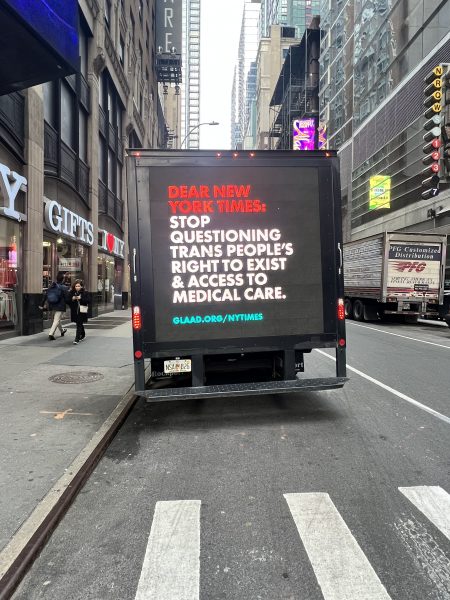
“It’s so dehumanizing,” added Caraballo, “because you have people debating your rights who have no stake in it whatsoever. They’re not the ones that are going to be denied healthcare. They’re not the ones who are going to be denied housing. They’re not the ones who are going to be kicked out of their homes when they’re forcibly outed to their parents. They have no stake in this. And that is particularly what’s so upsetting, to see all these people that literally will never feel the effects of these policies, constantly talking about how they have ‘concerns.’”
Will the Times agree to their demands?
Drennen said it’s hard to say whether these open letters will have any impact, because “so much of their decision-making is internal.”
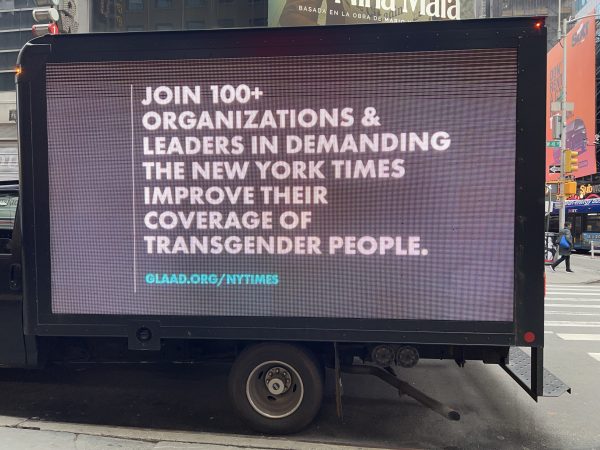
For her part, Walker said she remains excited by the coalition that’s been assembled and optimistic, but also realistic.
“Ideally what happens is the New York Times says, ‘Okay, yeah, let’s stop debating whether trans people should be allowed,’ and they start hiring a bunch of trans people. It’s the end of the story. I’m also realistic. I think it’s important to keep some idealism and some optimism in place and also realistic at the same time, which I also think is important. And I fully expect them to do their best to ignore it.”
“We’re too loud to ignore. If you ignore our letter, we’ll find some other way. If you ignore that, we’ll find another way,” Ellis said. “We’re not going to quit until the New York Times acknowledges our demands. And our demands are not outrageous. Within the letter, we’re just talking about stopping your irresponsible reporting, meeting with the trans community and hiring trans writers and editors. These are not outrageous demands that we’re making.”
Charlie Stadtlander, the director of external communications, newsroom, for the Times responded Wednesday afternoon in an email to the Blade addressing the controversy:
“We received the open letter delivered by GLAAD and welcome their feedback. We understand how GLAAD and the co-signers of the letter see our coverage. But at the same time, we recognize that GLAAD’s advocacy mission and the Times’s journalistic mission are different.
As a news organization, we pursue independent reporting on transgender issues that include profiling groundbreakers in the movement, challenges and prejudice faced by the community, and how society is grappling with debates about care.
The very news stories criticized in their letter reported deeply and empathetically on issues of care and well-being for trans teens and adults. Our journalism strives to explore, interrogate and reflect the experiences, ideas and debates in society — to help readers understand them. Our reporting did exactly that and we’re proud of it.”
Read the letters and who signed them by clicking here.
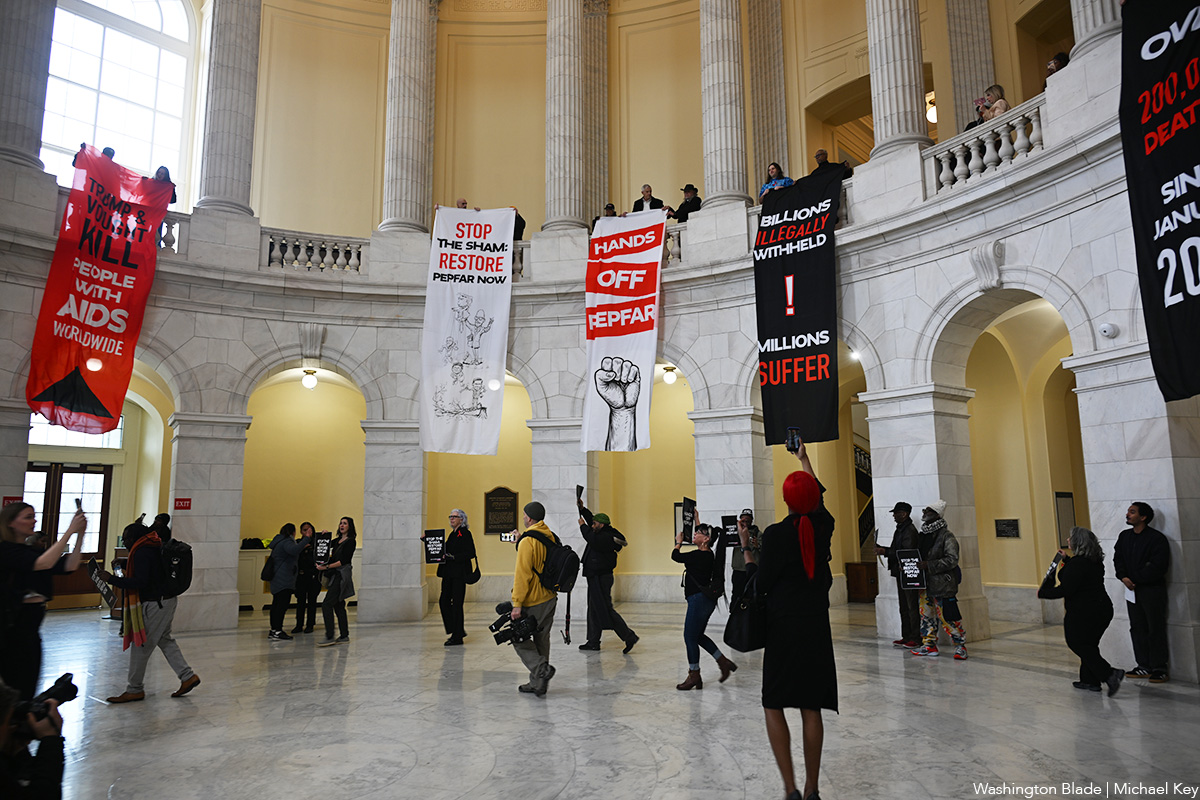
U.S. Capitol Police on Thursday arrested 13 HIV/AIDS activists in the Cannon House Office Building Rotunda.
The activists — members of Housing Works, Health GAP, and the Treatment Action Group — joined former PEPFAR staffers in demanding full funding of the program that President George W. Bush created in 2003. They chanted “AIDS cuts kill, PEPFAR now!” and unfurled banners from the Rotunda’s second floor that read “Trump and (Office of Management and Budget Director Russell) Vought kill people with AIDS worldwide,” “Over 200,000 deaths since January 2025,” and “Hands off PEPFAR” before their arrest.
(Washington Blade video by Michael K. Lavers)
This protest is the latest against the Trump-Vance administration’s HIV/AIDS policies since it took office.
Secretary of State Marco Rubio on Jan. 28, 2025, issued a waiver that allowed PEPFAR and other “life-saving humanitarian assistance” programs to continue to operate during a freeze on nearly all U.S. foreign aid spending. HIV/AIDS service providers around the world with whom the Washington Blade has spoken say PEPFAR cuts and the loss of funding from the U.S. Agency for International Development, which officially closed on July 1, 2025, has severely impacted their work.
The State Department last September announced PEPFAR will distribute lenacapavir in countries with high prevalence rates. Zambia is among the nations in which the breakthrough HIV prevention drug has arrived.
The New York Times last summer reported Vought “apportioned” only $2.9 billion of $6 billion that Congress set aside for PEPFAR for fiscal year 2025. (PEPFAR in the coming fiscal year will use funds allocated in fiscal year 2024.)
Bipartisan opposition in the U.S. Senate prompted the Trump-Vance administration last July withdraw a proposal to cut $400 million from PEPFAR’s budget. Vought on Aug. 29, 2025, said he would use a “pocket rescission” to cancel $4.9 billion for HIV/AIDS prevention and global health programs and other foreign aid assistance initiatives that Congress had already approved.
The White House in January announced an expansion of the global gag rule to ban U.S. foreign aid for groups that promote “gender ideology.” President Ronald Reagan in 1985 implemented the original regulation, also known as the “Mexico City” policy, which bans U.S. foreign aid for groups that support abortion and/or offer abortion-related services. The Council for Global Equality and other groups say the expanded rule will adversely impact HIV prevention efforts around the world.
A press release that Housing Works and Health GAP issued on Thursday notes more than $977 million “in appropriated PEPFAR funding for HIV prevention and treatment was unspent by the end of fiscal year (FY) 2025 — triple amount unspent at the end of FY 2024.”
“Activists predict this backlog will worsen rapidly in FY 2026 unless Congress immediately reasserts its Constitutionally-mandated oversight authority,” notes the press release.
The press release also indicates funding for the Centers for Disease Control and Prevention’s PEPFAR programs “will run out” by April 1 because “only 45 percent of their FY26 funding has been transferred from the State Department.
“Unless funding is transferred immediately, CDC’s global HIV programs across sub-Saharan Africa, Asia and the Caribbean will grind to a halt,” notes the press release.
The activists demanded Trump, Vought, Rubio, and Congress do the following:
- Activists are calling for full obligation of appropriated PEPFAR funds and rejection of growing political interference in global and domestic HIV programs
- Immediately release already-appropriated, unobligated PEPFAR funds
- Break the blackout on PEPFAR data, so Congress and people with HIV know how funding is being spent and can program based on data
- Activists are calling for full obligation of appropriated PEPFAR funds and rejection of growing political interference in global and domestic HIV programs.
“PEPFAR has saved more than 26 million lives and changed the trajectory of an epidemic,” said Housing Works CEO Charles King. “However, the Trump administration’s decision, over the objection of Republicans in Congress, to freeze PEPFAR funding has caused decades of progress to come undone and has been a death sentence for people with HIV relying on life-saving treatment. The U.S. must immediately restore PEPFAR funding and regain our standing in the global fight against HIV.”
King is among the activists who were arrested.
(Washington Blade video by Michael K. Lavers)

Texas state Rep. James Talarico won a hard-fought primary Tuesday to become the state’s Democratic nominee for U.S. Senate, defeating U.S. Rep. Jasmine Crockett in one of the year’s most closely watched and competitive Democratic contests.
Talarico, a Presbyterian seminarian and three-term lawmaker from Round Rock, was declared the winner by the Associated Press early Wednesday morning after a closely tracked vote count that drew national attention.
“Tonight, the people of our state gave this country a little bit of hope,” Talarico told the AP. “And a little bit of hope is a dangerous thing.”
With 52.8% of the vote to Crockett’s 45.9%, Talarico secured the nomination outright, avoiding a runoff and capping months of sharp contrasts between the two candidates over strategy, messaging, and how best to compete statewide in Texas. Democrats hope the competitive primary — and the relatively narrow margin — signals growing momentum in a state that has not elected a Democrat to the U.S. Senate since 1988.
Talarico has long expressed support for the LGBTQ community, a position he highlights prominently on his campaign website. Under the “Issues” section, he directly addresses assumptions that might arise from his faith and background as a seminarian in a deeply conservative state.
“My faith in Jesus leads me to reject Christian Nationalism and commit myself to the project of democracy,” his website reads. “Because that’s the promise of America: a democracy where every person and every family — regardless of religion, race, gender, sexual orientation, or any other difference between us — can truly be free and live up to their full potential.”
Crockett struck a conciliatory tone following her defeat, emphasizing party unity ahead of November.
“This morning I called James and congratulated him on becoming the Senate nominee,” Crockett told Politico. “Texas is primed to turn blue and we must remain united because this is bigger than any one person. This is about the future of all 30 million Texans and getting America back on track.”
Talarico also drew national attention earlier in the race when “Late Show” host Stephen Colbert said he was initially unable to air an interview with the state legislator due to potential FCC concerns involving CBS. The episode sparked a broader political debate.
Brendan Carr, chair of the Federal Communications Commission, appointed by President Donald Trump, told reporters the controversy was a “hoax,” though he also acknowledged Talarico’s ability to harness the moment to build support as an underdog candidate. The interview was later released online and garnered millions of views, boosting Talarico’s national profile.
In November, Talarico will face the winner of the Republican primary between incumbent Sen. John Cornyn and Texas Attorney General Ken Paxton, who have been locked in a bruising GOP contest. Rep. Wesley Hunt was also in the Republican primary field. The GOP race is expected to head to a May runoff.
In a joint statement, Senate Minority Leader Chuck Schumer and Democratic Senatorial Campaign Committee Chair Kirsten Gillibrand praised Talarico’s victory and framed him as a candidate capable of broad appeal.
“As an eighth-generation Texan, former middle school teacher, and Presbyterian seminarian, James will be a fighter for Texans from all walks of life and of all political stripes,” they said. “In November, Texans will elect a champion for working people: James Talarico.”
National
Peter Thiel’s expanding power — and his overlap with Jeffrey Epstein
Gay billionaire’s name appears 2,200 times in files, but no criminality alleged

There are few figures in modern politics whose reach extends across Silicon Valley, Wall Street, and Washington, D.C., as Peter Thiel’s.
A billionaire venture capitalist, Thiel built his fortune at the dawn of the internet age and has since positioned himself at the highest levels of U.S. technology, finance, and national defense infrastructure. He is best known as a co-founder of PayPal, an early investor in Facebook, and the co-founder of Palantir Technologies — a data analytics firm that maintains significant contracts with U.S., U.K., and Israeli defense and intelligence agencies.
Over the last two decades, Thiel has also built an interconnected network of investment vehicles — Clarium Capital, Founders Fund, Thiel Capital, Valar Ventures, and Mithril Capital — giving him influence over emerging technologies, political candidates, and ideological movements aligned with his worldview. Through these firms, Thiel has backed companies in artificial intelligence, defense technology, biotech, cryptocurrency, and financial services, often positioning himself early in sectors that later became central to public policy debates.
Born in Frankfurt, West Germany, in 1967, Thiel immigrated to the United States as an infant. He later attended Stanford University, earning a degree in philosophy before graduating from Stanford Law School in 1992. As an undergraduate, he founded The Stanford Review, a conservative student publication that opposed what it described as campus “political correctness.” The paper became a platform for combative and contrarian arguments that previewed themes Thiel would revisit in later essays and speeches about elite institutions, democracy, and technological stagnation.
Thiel’s professional ascent coincided with the explosive growth of the dot-com era. In 1998, he co-founded PayPal, helping pioneer digital payment systems that would become foundational to online commerce. When the company was sold to eBay in 2002 for $1.5 billion, Thiel emerged a multimillionaire and part of what would later be known as the “PayPal Mafia” — a loose but influential network of founders and early employees who went on to launch or invest in some of Silicon Valley’s most dominant firms.
In 2004, Thiel made one of the most consequential investments of his career, providing $500,000 in seed funding to Facebook, then a fledgling social network founded by Mark Zuckerberg. He became the company’s first outside investor and later served on its board. That early bet proved extraordinarily lucrative and cemented Thiel’s status as a major venture capitalist with a reputation for identifying transformative platforms before they reached scale.
The same year, he co-founded Palantir Technologies. Initially backed in part by In-Q-Tel, the CIA’s venture capital arm, Palantir developed software — including its Gotham platform — designed to help defense, intelligence, and law enforcement agencies integrate and analyze massive datasets. The company’s tools allow users to map relationships, identify patterns, and visualize complex networks across financial records, communications data, and other digital trails.
Over time, Palantir secured billions of dollars in public-sector contracts. It has worked with the U.S. Department of Defense, Immigration and Customs Enforcement, the Centers for Disease Control and Prevention, and allied governments abroad. Public reporting has documented that its global government contracts exceed $1.9 billion, including agreements with Israeli defense entities — relationships that reportedly expanded following the Oct. 7 attacks in Israel. Critics have raised concerns about civil liberties and surveillance, while supporters argue the company provides essential national security tools.
By the mid-2000s, Thiel was no longer simply a wealthy entrepreneur. He was a financier operating at the intersection of capital, advanced technology, and government — with investments embedded in some of the country’s most sensitive security systems. His political giving would later extend that influence further, including support for candidates aligned with his populist and nationalist leanings– notably Donald Trump in 2016.
As his wealth and influence expanded, so too did his proximity to other powerful — and, in some cases, controversial — figures in global finance.
Among them was Jeffrey Epstein.
Thiel’s name appears more than 2,200 times in documents released so far by the U.S. Department of Justice related to Epstein. A name appearing in legal filings does not, by itself, indicate wrongdoing. However, the extensive references illustrate that Epstein’s social and financial network intersected with elite figures in technology, academia, politics, and finance — including individuals connected to Thiel’s business and philanthropic circles.
Epstein’s legal troubles became public in 2005, when police in Palm Beach, Fla., investigated allegations that he had sexually abused a minor. In 2008, he pleaded guilty in state court to soliciting prostitution from a minor under a plea agreement that was widely criticized as unusually lenient. He served 13 months in county jail with work-release privileges and was required to register as a sex offender. Comparable federal charges can carry significantly longer sentences.
Despite that conviction, Epstein continued to maintain relationships with prominent business and political figures for years. The extent to which members of elite networks remained in contact with him after his guilty plea has been the subject of extensive scrutiny.
Documents released by the Justice Department indicate that individuals connected to Thiel’s philanthropic and investment circles communicated with Epstein after his conviction. One document shows an invitation, sent on behalf of the Thiel Foundation, for Epstein to attend a technology event in San Francisco. Additional financial records and reporting indicate that between 2015 and 2016, Epstein invested approximately $40 million in funds managed by Valar Ventures, one of Thiel’s firms. Other records reflect meetings and correspondence, at times arranged through intermediaries. Epstein also extended invitations to his Caribbean residence.
There is no evidence that Thiel was involved in Epstein’s criminal conduct. The documented interactions do, however, show numerous planned meetings between the two both in the Caribbean (where Epstein’s infamous island is located) and across the world, while also raising questions about why business relationships continued after Epstein had pleaded guilty to a sex offense involving a minor and was a registered sex offender. For critics, that continued engagement speaks to the insular nature of elite finance, where access to capital and networks can override reputational risk.
Palantir represents another overlap. In emails made public through Justice Department releases, Epstein referenced Palantir in correspondence with Ehud Barak, the former Israeli prime minister who also maintained ties to Epstein. The emails do not indicate that Epstein had operational involvement in Palantir or access to its systems, however, they show that he discussed one of Thiel’s most strategically significant companies — a firm deeply integrated into Western defense and intelligence systems — with senior political figures abroad.
Separately, Thiel’s long-running dispute with Gawker Media offers additional insight into how he has exercised power outside traditional political channels.
After Gawker published an article in 2007 that publicly identified Thiel as gay, he later secretly funded litigation brought by professional wrestler Hulk Hogan over the outlet’s publication of a sex tape. The lawsuit resulted in a $140 million judgment against Gawker, which ultimately filed for bankruptcy. Thiel later confirmed his financial backing of the case, framing it as a defense of privacy and a response to what he considered reckless media behavior.
The episode demonstrated Thiel’s willingness to deploy substantial financial resources strategically and, at times, discreetly. It also illustrated how wealth can be used to influence institutions — whether through venture capital, political donations, or litigation.
Taken together, the record does not establish criminal liability for Thiel in connection with Epstein. It does, however, situate him within a dense web of elite finance, national security contracting, political influence, and reputation management. As additional documents related to Epstein continue to emerge, that web — and the decisions made within it — remains a subject of public interest and ongoing scrutiny.


















